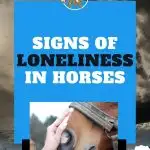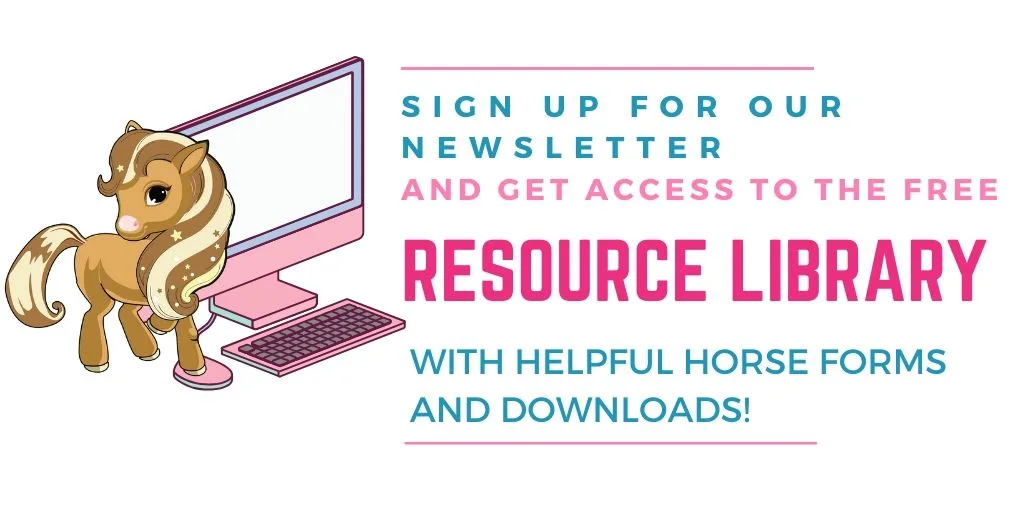Horses do get lonely if they don’t have interaction with other horses or humans. Key signs of loneliness like restlessness, loss of appetite/weight loss, and stress behaviors like kicking, cribbing, calling, and sweating can all be signals of stress from isolation.
This can lead to bigger issues down the line, but there are some ways you can help by offering an emotional support animal and more interaction to your horse with enrichment activities or horse play-dates.
Table of Contents
Key Takeaways
- The 5 most common signs of loneliness in horses are 1) pacing/restlessness 2) loss of appetite/weight 3) calling or whinnying 4)cribbing and 5)excess kicking. Sweating or lack of normal reactions can also be indicators.
- To ease or treat loneliness in a horse, consider adding a smaller animal for company, like a goose or cat, and put mirrors up so that the horse can see itself (source).
- There is no substitute for real human or horse interaction for a horse long-term, and continued isolation can lead to depression.
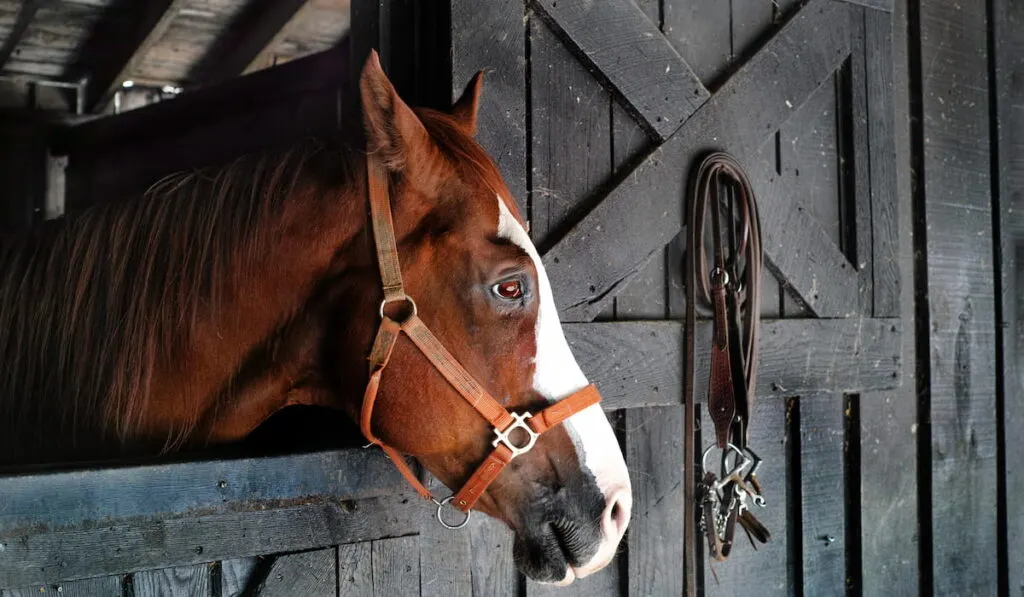
What Are Signs of Loneliness in Horses?
According to equine experts, understanding horse behavior is essential to prevent issues like depression in horses and stress responses caused by feeling alone or social isolation (Reference: Katherine Reid, Chris W. Rogers, Journal of Veterinary Behavior Vol 22, 2017, P 1-6).
Horses, being social animals, often exhibit distinct signs of loneliness, which, if not addressed, can lead to adverse health effects. In the following table, we’ll present the most common signs of loneliness or isolation in horses. After that, we’ll delve into these behaviors in more detail, so you can ensure your horse’s mental well-being in the stable or paddock.
| Sign of Loneliness | Behavior Description with Confirmation Indicators |
|---|---|
| Lack of Reactions | Horses appear withdrawn and unresponsive to their surroundings, characterized by minimal reaction to new stimuli, staying still for long periods, ears and head immobile, and eyes open but unfocused. |
| Pacing or Restlessness | Continuous pacing along the fence line or general restlessness, indicated by constant movement, turning at the fence, walking in circles, stamping hooves, and physical strain signs like joint/tendon damage. |
| Calling | Frequent, sharp, and urgent-sounding neighs and whinnies, different from typical sounds, often accompanied by physical signs like stomach ulcers. |
| Cribbing | Kicking at the stall or showing signs of agitation without apparent reason, indicative of stress and frustration due to pent-up social energy with nowhere and no one to spend it on. |
| Loss of Appetite | Reduced interest in food, eating less than usual, more time spent being restless or pacing, along with signs of stress, indicating a focus on feelings of loneliness rather than eating. |
| Kicking | Kicking at the stall or showing signs of agitation without apparent reason, indicative of stress and frustration due to pent up social energy with nowhere and no one to spend it on. |
| Sweating | Excessive sweating in normal or cool conditions without physical exertion, indicative of stress and discomfort, similar to ‘nervous sweating’ in humans in high-stress situations. |
Since horses are ultimately a prey animal, they have a fight-or-flight response that is affected by their feeling of social safety or protection. Domesticated horses may be safe, but their physiology doesn’t know they’re a draft horse that simply isn’t needed much during winter (for instance).
Over time, isolation will drive anxiety and fear in the horse, leading to physiological stress responses that can raise cortisol levels in the horse’s bloodstream, affecting blood pressure, blood sugar, and immune system performance. Interaction, on the other hand, releases endorphins as the normal/social interactions soothe the horse’s parasympathetic nervous system. (source: Wikipedia)
Lack of Reactions
Just like humans, when horses are lonely, they can become depressed. Also just like humans, a common symptom of depression is becoming withdrawn, uninterested or unaware in situations around them.
You can tell when your horse is withdrawn, as it will tend not to respond to things around it.
For example, a study was done with 50 horses in which unusual animal sounds were played. The horses that were not perceived to be lonely and depressed reacted with interest, curiosity or even trepidation.
Their ears pricked up, their heads turned to the sound, and they licked their lips in concentration on the new thing. The lonely horses, though, registered no reaction. They did not acknowledge something new and strange, and they seemed unaware of it.
You do not need to conduct your own study to notice horses that don’t react. These horses will usually stay still for a long time; their ears, too, will not move for lengths of time. Their heads and necks will remain fixed, and their eyes tend to be open, but wide and unfocused, with a long time between blinks.
Pacing or Restlessness
If your horse constantly paces back and forth at the fence line, that is an important sign of loneliness. It may be that there are no other horses or animals at the barn and so it sticks to the outside of the pasture out of boredom and hope. It also may be that it has a buddy who is in a separate field or who is kept in a stall.
Pacing is not only a bad sign for mental health, but it can also lead to physical health problems as well. Pacing puts extra strain on a horse’s legs, which can lead to joint and tendon damage caused by repetitive motion.
Another risk is ringbone (a type of arthritis in the horse’s lower leg), as constant turning strains the joints.
Your horse may not be strictly pacing in a “back and forth at the fence line” sense, but it could be just generally restless. If your horse is overly fidgety, walking in circles, or keeps stamping its hooves – all these are signs of restlessness that arise when a horse is bored.
If your horse doesn’t have a friend to keep it company and its mind occupied, it may show these bored, restless motions, much like a toddler who is under-stimulated.
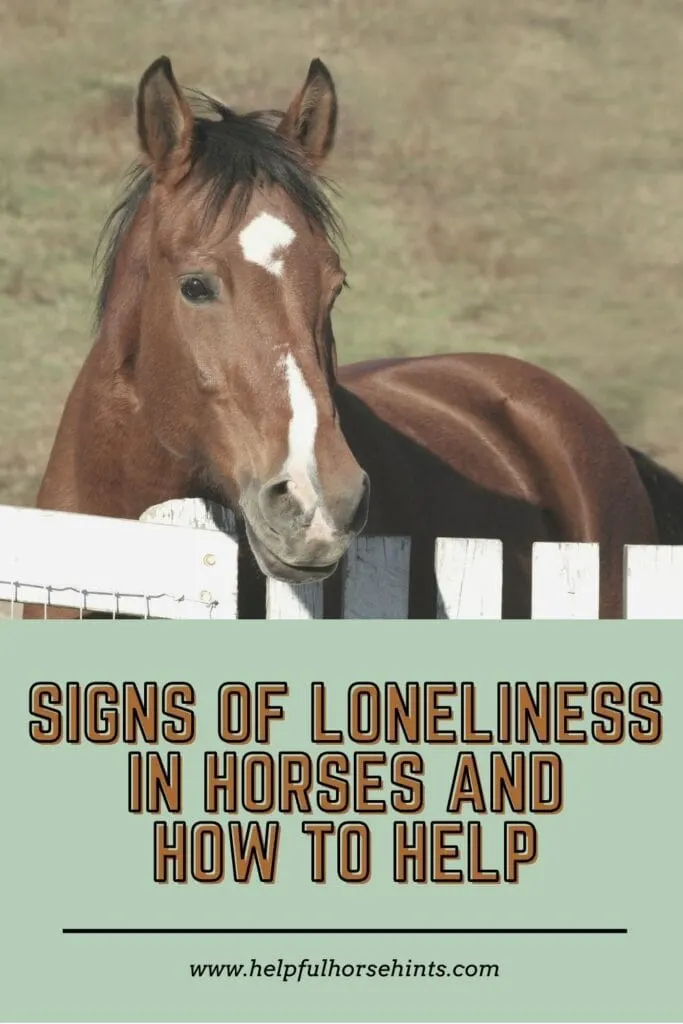
Calling
Living in a stall is unnatural for a horse. Horses are naturally used to open spaces and not confinement – and they aren’t used to being separated from their herd. Apart from necessary stall rest for sickness or injury, horses shouldn’t be kept confined.
A horse that is alone in a stall will often call out. The sound is not like typical neighs and whinnies – the call is not only sharper and more urgent, but it will also be excessively repeated. Lots of whinnying is a cry for help and a cry for friendship.
This stressor can lead to other physical manifestations, too, such as stomach ulcers. Ulcers in the horse’s stomach and colon can affect a horse’s appetite, causing weight loss, a dull coat, a loss of interest in work, behavioral issues, and more.
Cribbing
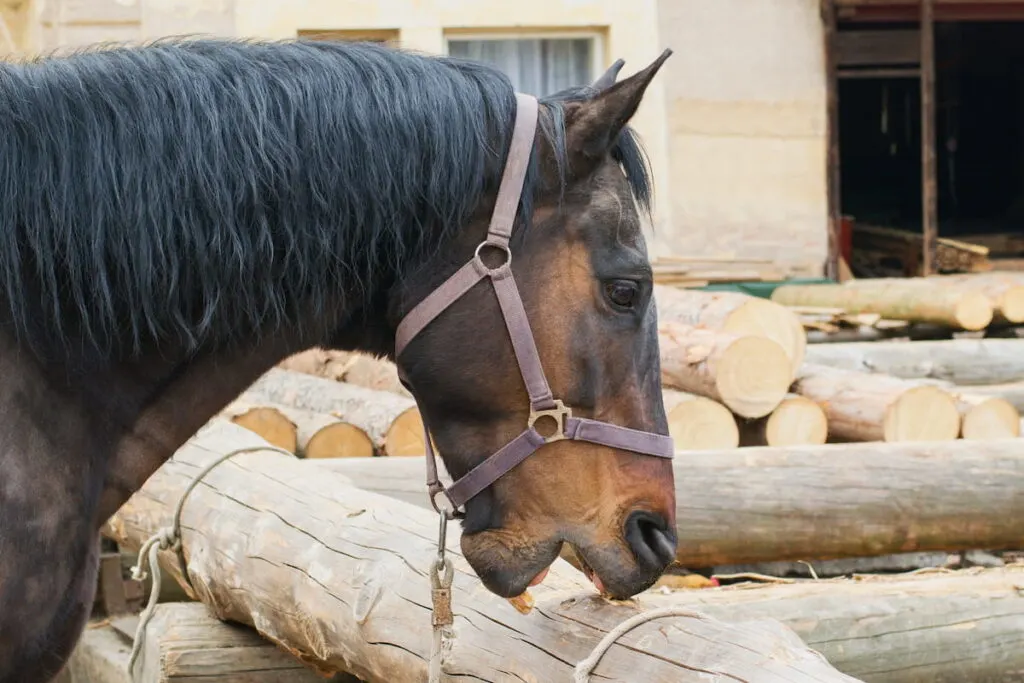
Cribbing is when a horse compulsively bites a fence rail (or something similar). A cribbing horse may also “wind suck,” where it arches its neck and sucks in, contracting its lower neck muscles as air rushes in. You will hear an accompanying grunt with most cribbing.
This is an addictive and fixating behavior that often occurs when a horse is bored or lonely. If a horse is kept on its own, its mind can become overwhelmed by boredom, stress, and loneliness, resulting in this neurotic behavior to cope.
Loss of Appetite
Lonely horses may not eat as much as they would under normal circumstances. They are often not interested in food anymore, as their minds are more focused on feeling lonely.
This also connects to a restless nature, as more time spent pacing or fidgeting is time spent not eating. And, if they are on edge about being alone, they often just won’t feel as hungry.
While loneliness isn’t a direct physical threat, it still triggers the stress of the “fight or flight” reaction, which dampens the appetite and heightens the horse’s state of alert.
Kicking
A horse who is generally even-tempered may develop some bad habits when left alone. Sometimes, sadness and loneliness in horses can manifest as anger or frustration.
You may notice your horse kicking at the stall because they have pent-up social energy with nowhere and no one to spend it on. This does not mean the horse is aggressive or badly behaved generally, but it is a warning sign that it is becoming agitated by loneliness and stress, which can cause behavior problems if left unchecked.
Bucking behavior can be considered similar to kicking as a signal here. See our related article on 9 Reasons Your Horse is Bucking for more.
Sweating
Excessive sweating is a stress behavior in horses, and as we’ve seen being alone can cause horses to feel stressed. If it is a normal, cool day and your horse has not been exercising yet it is sweating, which is most likely stress sweat.
Just like humans who can have “nervous sweating” in response to a high-stress situation, horses who are alone and unhappy about that can react with stress sweat in a similar way. And note that foaminess of the sweat is pretty natural (see our related resource on horse sweat and foam).
How You Can Help A Lonely Horse? Most Popular Stress Prevention Tactics
Having another horse can be expensive, but luckily horses are rather sociable with many animals. You might consider a different farm friend for your horse, such as a donkey, llama, cow – even a goose! An “emotional support animal” for your horse works wonders.
You can also simply add some mirrors around the stable–adding mirrors has been shown to ease social isolation and stress in horses (reference: Rachel Kay, Carol Hall-Applied Animal Behaviour Science, Volume 116, Issues 2–4).
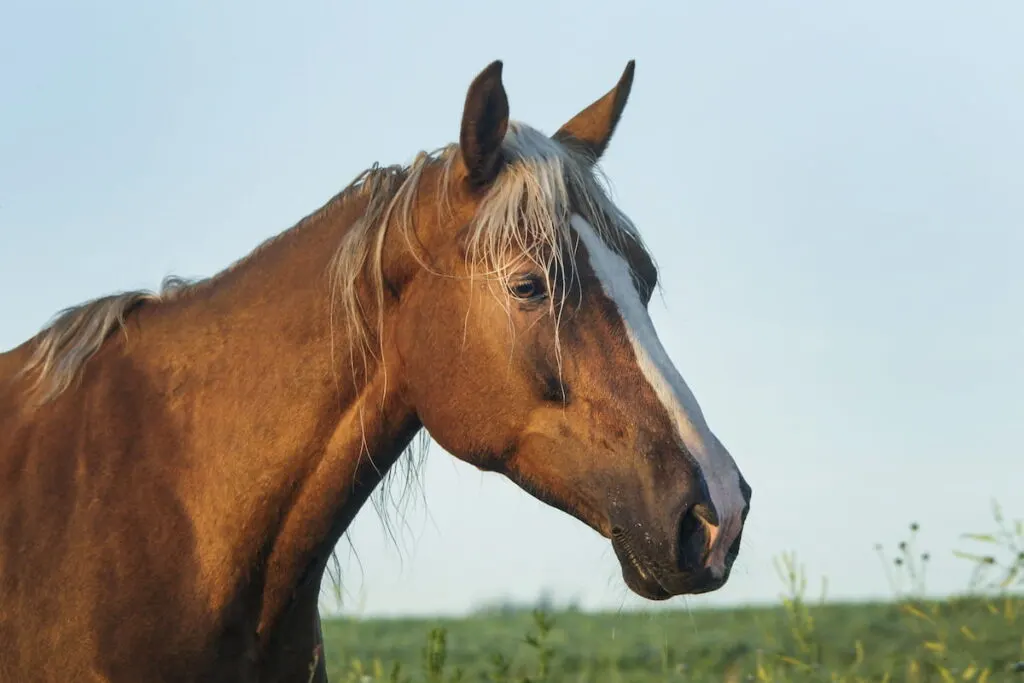
Another option to consider is taking on a senior horse. Older horses who can no longer be ridden have a harder time finding homes, but that doesn’t mean they aren’t still full of life and love!
Senior horses don’t require tack, they don’t suffer riding-related injuries and they eat less. Adopting a senior horse as a pasture pal not only keeps your current horse happy with a friend, but it gives a deserving older equine a loving home to live out the rest of their years.
As creatures with great social intelligence, a horse kept by itself can be a lonely one indeed. Though not all horses are the same (some do better with being alone than others), you will want to observe your horse and know what to look for if it does start feeling lonely.
While horses and humans have a long history of being excellent companions for each other, a human can’t fulfill all of a horse’s social needs, just as a horse doesn’t fulfill all the social needs of a person. If your horse is showing signs of being unhappy being alone, don’t take it personally – but do look into providing them with a friend, whether it’s a horse or another companion animal.
Frequently Asked Questions
Can Horses Live Alone Without Other Horses?
Horses can live alone, but if your horse is alone, it is important to provide sufficient mental and physical stimulation to prevent stress and loneliness. The most effective way to ensure their well-being and eliminate loneliness is by regular human interaction, enrichment activities, and, if possible, occasional contact with other horses.
Do Horses Get Bored? (Boredom vs. Loneliness in Horses)
Yes, horses can get bored, especially when they lack mental and physical stimulation. Boredom in horses is different from loneliness, though they can overlap. A bored horse may engage in repetitive behaviors or seem lethargic, while a lonely horse often shows signs of distress and seeks companionship.
How Do You Know If Your Horse Is Sad?
You can tell if your horse is sad by observing changes in behavior. Signs of sadness in horses include lack of interest in surroundings, reduced interaction with humans or other horses, changes in eating or sleeping patterns, and a general decrease in activity levels. These signs, especially when persistent, indicate emotional distress. If your horse seems sad, consider if loneliness could be the cause.

